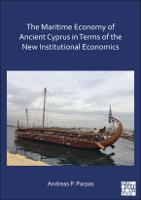The Maritime Economy of Ancient Cyprus in Terms of the New Institutional Economics
Author(s)
Parpas, Andreas P.
Collection
Knowledge Unlatched (KU)Language
EnglishAbstract
"The Maritime Economy of Ancient Cyprus in Terms of the New Institutional Economics deals with the maritime economy of ancient Cyprus from 1450 BC to 295 BC, and comprises three parts which correspond to three distinct economic cycles: first economic cycle during the age of internationalism 1450–1200 BC second economic cycle during political volatility, economic growth and transformation 1200–525 BC third economic cycle in the Persian Empire until annexation into the Ptolemaic kingdom. The principles of New Institutional Economics are used to trace the island’s institutions and their continuity and to reconstruct its maritime history. A unique feature is that for the first time a traditional descriptive and cultural approach is complemented by systematic and mathematical analysis and marketing documentation which results in meaningful examination of economic performance. This new approach highlights and explains the maritime economic activity of Ancient Cyprus and the Eastern Mediterranean in general. It brings together, for the first time, three distinct disciplines, that is History, Archaeology and Economic theory, in order to create a balanced explanation and reconstruction of the maritime economy of ancient Cyprus and of the challenges which confronted the ancient seafarers and traders of the Eastern Mediterranean. The approach and methodology is influenced by the author’s engineering, business background and training."
Keywords
Social Science; ArchaeologyDOI
https://doi.org/10.32028/9781803272474ISBN
9781803272481Publisher
Archaeopress PublishingPublisher website
https://www.archaeopress.com/Publication date and place
2022Imprint
Archaeopress Publishing LtdClassification
Archaeology


 Download
Download